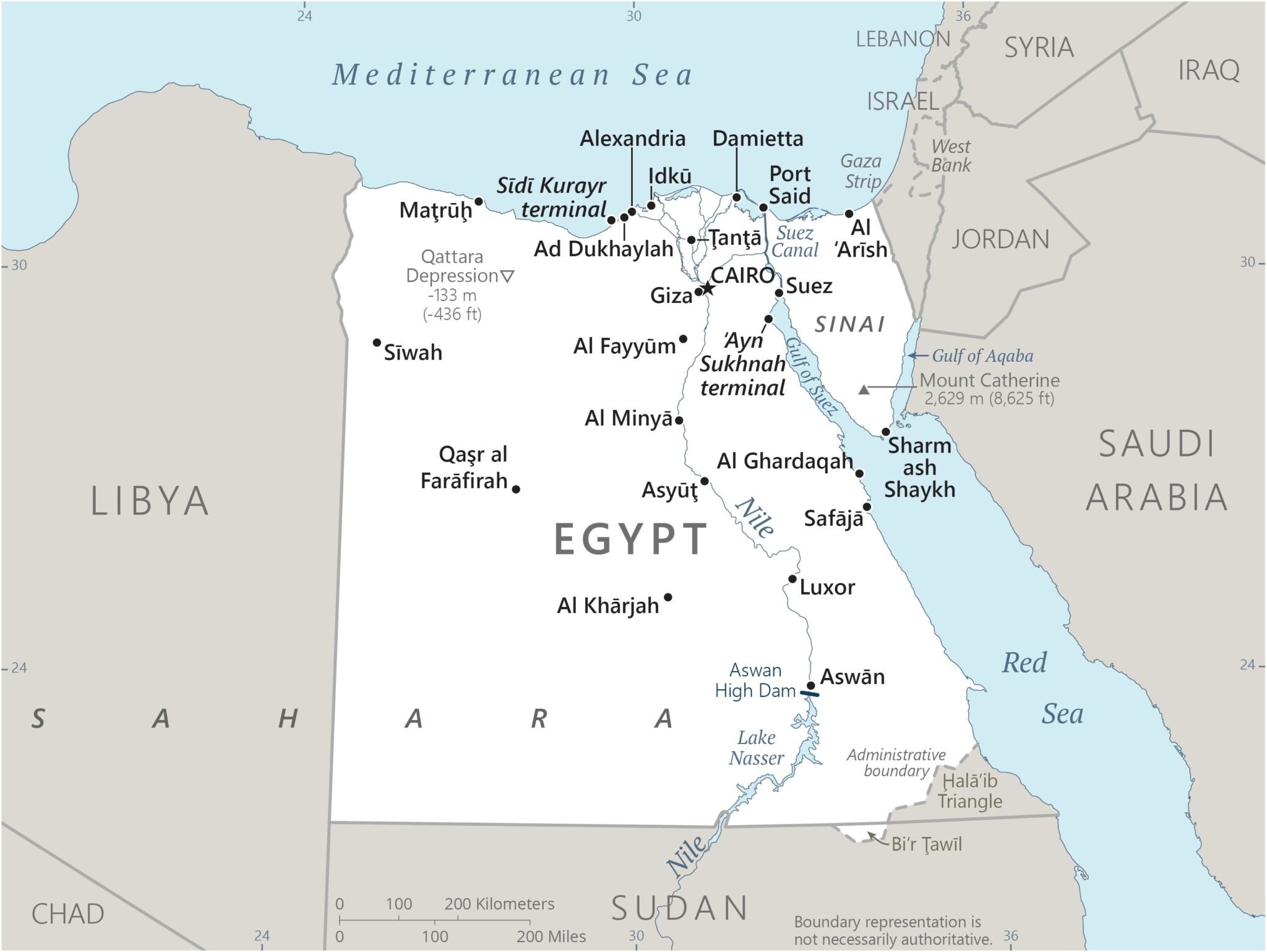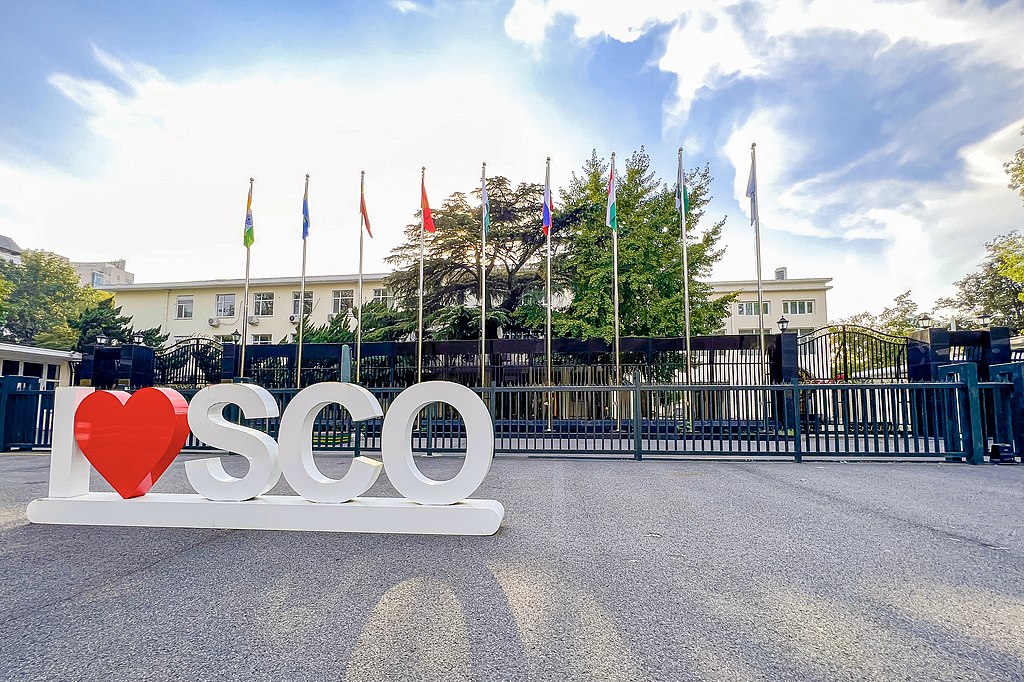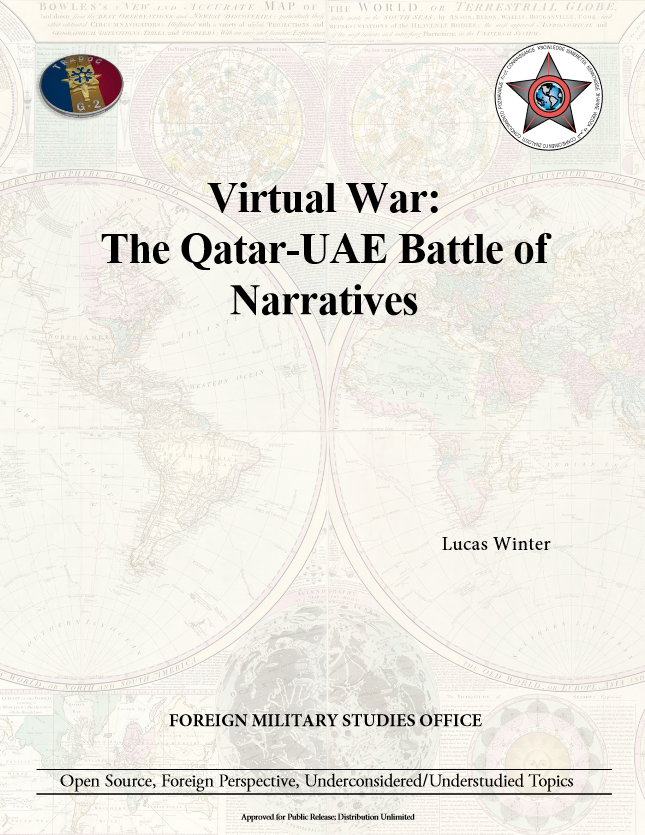
Map of Egypt showing major cities as well as parts of surrounding countries and the Mediterranean and Red Seas.
“Threats [to Egypt] usually come from the east, and Gaza is Egypt’s first line of defense…”
Egypt has turned its strategic focus toward its eastern border amidst rising concerns that violence from Israel’s military operation in Gaza could spill over into the Sinai Peninsula. Most concerning to Egypt’s military-led government is the potential of a massive influx of Palestinian refugees into the Sinai.[i] The Egyptian military, according to the first accompanying excerpt from the Qatar-aligned daily al-Araby al-Jadeed, is firmly opposed to any relocation of Gaza’s residents to the Sinai. Reflecting these principles, Egyptian President Sisi has stated that “Egypt has not and will never allow the displacement of Palestinians from Gaza to Sinai.”[ii] A secondary security concern for Egypt’s Armed Forces is cross-border fire from errant projectiles from both sides of the conflict.[iii] As a result of these concerns, Egypt has begun to quietly take precautions. It has increased its military and security presence around the Rafah border crossing.[iv] In late October, Egyptian military leadership conducted a readiness inspection of the Armed Forces’ 4th Armored Division, 3rd Field Army, based in Suez.[v] Military and security measures alone, however, are unlikely to ease the mounting pressure on Egypt’s border with Gaza. The second accompanying excerpt, also from al-Araby al-Jadeed, argues that Egypt will need to overhaul its strategic thinking to cope with these pressures. To do so, the author argues, the Egyptian government should provide immediate, open support for Hamas via all means possible short of war. In addition, he argues that Egypt should begin to “coordinate positions as closely as possible and share concerns and capabilities with Qatar, Turkey, Iran, and Jordan.”
Sources:
مخططات تهجير الفلسطينيين إلى سيناء… رفض مصري ممتد لعقود
“Decades-long Egyptian rejection of plans to forcibly relocate Palestinians to Sinai,” Al-Araby al-Jadeed (Qatari-aligned daily), 2 November 2023.https://www.alaraby.co.uk/politics/مخططات-تهجير-الفلسطينيين-إلى-سيناء-رفض-مصري-ممتد-لعقود
Despite these fears, this plan still depends on many factors in order to implement it, “some of which are almost impossible,” according to the description of a former Egyptian security official, who spoke to Al-Araby Al-Jadeed on condition of anonymity. On top of these factors is “the position of the Egyptian military establishment, which absolutely rejects the idea of settling Palestinians in Sinai , due to many considerations related to Egyptian national security.”
The former official added, “The army’s rejection of that idea existed previously, during the era of the late President Hosni Mubarak, and it still exists today, which can be seen in the messages conveyed in President Abdel Fattah El-Sisi’s recent speeches, which seemed to be directed to the armed forces in order to reassure its leaders and allay their fears.”
لماذا على مصر التفكير في أمنها القومي بشكل مختلف؟
“Why should Egypt think about its national security in a different way?” Al-Araby al-Jadeed (Qatari-aligned daily), 12 November 2023. https://www.alaraby.co.uk/opinion/لماذا-على-مصر-التفكير-في-أمنها-القومي-بشكل-مختلف
… Egyptian national security theory and its constants, or what remains of those constants, the most important of which is that threats usually come from the east, and Gaza is Egypt’s first line of defense, and that whenever Gaza collapses, Egypt’s defensive lines collapse, regardless of the degree of compatibility with the political or administrative system in power following the collapse…
The Egyptian government must immediately stop talking about more than meager aid, as after a month of aggression, no more people entered the Gaza Strip than they did one day before. It must restrain the “Samsung media”, as this is a major national security issue and a top priority, and this is not the time to export hatred for the Palestinian resistance and belittle it, nor the time to outbid it, condemn it, or blame the victims in any way. Rather, it is the best piece of chess through which everything you want can be achieved. Without a single concession. Egypt should coordinate positions as closely as possible and share concerns and capabilities with Qatar, Turkey, Iran, and Jordan.
Notes:
[i] The idea of a population transfer from Gaza to the Sinai is not new and has been floated several times before. Since 7 October, several Israeli statements and documents have alluded to the forcible displacement of Gaza’s population as a policy option. See for instance: “An Israeli ministry, in a ‘concept paper,’ proposes transferring Gaza civilians to Egypt’s Sinai,” AP, 30 October 2023. https://apnews.com/article/israel-gaza-population-transfer-hamas-egypt-palestinians-refugees-5f99378c0af6aca183a90c631fa4da5a; Giora Eiland. “It’s time to rip off the Hamas band-aid,” Ynet News, 12 October 2023. https://www.ynetnews.com/article/sju3uabba
[ii] Statement quoted in: “Defend and populate Sinai,” al-Ahram Weekly, 31 October 2023. https://english.ahram.org.eg/News/511373.aspx
[iii] This includes projectiles fired toward Israel from the south that have landed along the Sinai’s Red Sea coast, as well as cross-border Israeli fire that hit an Egyptian border guard post near Gaza. On the former, see: “Drone blasts hit two Egyptian Red Sea towns, Israel points to Houthi,” AP, 27 October 2023. https://www.reuters.com/world/middle-east/explosion-heard-egyptian-red-sea-town-near-israeli-border-witness-2023-10-27/ On the latter, see: “At least seven injured as Israeli tank ‘accidentally’ hits Egyptian border,” al-Jazeera, 22 October 2023. https://www.aljazeera.com/news/2023/10/22/at-least-seven-injured-as-israeli-tank-accidentally-hits-egyptian-border
[iv] Images of Egyptian special forces deployed in Rafah can be found at: https://twitter.com/mahmouedgamal44/status/1715623393909694745
[v] The inspection included the first official appearance of the South Korean K9A1 155 mm self-propelled howitzer in the Egyptian military. For images and description of the platforms involved see: https://twitter.com/mahmouedgamal44/status/1717074441501290762.
Image Information:
Image: Map of Egypt showing major cities as well as parts of surrounding countries and the Mediterranean and Red Seas.
Source: CIA Factbook, https://www.cia.gov/the-world-factbook/countries/egypt/map Attribution: Public Domain




